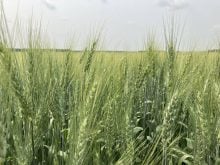Spring and summer flooding hasn’t dampened enthusiasm for the Canola Council of Canada’s newly revamped variety testing program.
“It has been a really good start to a new program and a new focus,” said Denise Maurice, vice-president of crop production with the council.
Trials are back in full swing after a one year hiatus to sort out problems growers and seed companies had with the old Prairie Canola Variety Trials.
There were reports that some of the biggest seed companies would not participate in the revamped program, but in the end most signed up.
Read Also

Why feds imposed EV tariffs
Moe and Kinew have a fight on their hands when it comes to eliminating the EV tariff. Canada has to worry about pissing off the U.S. and Mexico and hundreds of thousands of auto workers.
Bayer, Brett Young, Canterra, Cargill, Dow, FP Genetics, Monsanto, SeCan and Viterra have all submitted varieties for the small plot testing portion of the 2011 program.
The council is co-ordinating 32 small plot research sites across Western Canada — 15 in Saskatchewan, 10 in Alberta, five in Manitoba and two in British Columbia. Flooding has wiped out two of the five Manitoba sites.
Maurice said there was debate about the size of the plots. The governance body of what is temporarily being called the Canola Variety Testing Program eventually settled on conducting small plot trials augmented by data provided by the field-scale trials that many seed companies conduct each year.
Before any field trial data is included in the results it first has to be vetted by the program’s technical committee to ensure the protocol is scientifically sound.
Field trials will be inspected later in the season to ensure the companies did what they said they were going to do.
Monsanto, Bayer, Canterra and possibly Cargill are participating in the field trial portion of the program.
Viterra is not despite recently announcing the launch of a similar program of its own — Viterra Agronomic System Trials (VAST).
Canada’s leading grain company is sponsoring field trials of its new canola hybrids and competing hybrids at 45 test sites scattered across Western Canada. The plan was for 60 sites but 15 of them were washed away.
Monte Kesslering, vice-president of seed and crop protection for Viterra, said there was a glaring need to provide more information to growers.
“What we’ve identified as a gap is to get field-scale type testing of material that is still going through registration trials. There is really a need to do that,” he said.
Kesslering said small plot trials, such as those co-ordinated by the council and the 25 canola performance checks that Viterra will conduct this year, provide data on things like yields and relative maturity.
But field trials provide additional valuable information on swathing and combining attributes related to factors such as lodging resistance, straw strength and pod shattering resistance.
“When you actually get it being done with a farmer’s set of equipment it’s different than when we’re doing those trials with plot equipment,” he said.
Viterra is providing a select group of its customers with bags of seed of up to six different hybrid varieties, including two new experimental hybrids from the company’s VT Genetics program and the recently launched VT 500G hybrid.
Growers will be able to conduct side-by-side comparisons of the company’s new experimental hybrids with competing Viterra, Dekalb and Pioneer Roundup Ready hybrids that are commonly grown in their area.
“While yield is always important, the VAST canola trials give farmers a chance to see how a hybrid will perform in an actual production environment,” said Kesslering.
He encouraged growers who are interested in the hybrid trials to contact their local Viterra agronomist to arrange a firsthand tour.
Results will be published on the company’s website and distributed to interested growers.
Maurice said results of the Canola Variety Testing Program trials will be posted on the council’s website and published in a booklet and the provincial seed guides.
Growers need to look at this year’s results differently than they have in the past because there have been a number of changes to the variety trials.
For instance, newly registered varieties will be compared to the top-selling variety in the herbicide tolerant system to which they belong.
For the 2011 trials that will be Bayer’s InVigor 5440 for the Liberty Link system, Dekalb’s 72-65 for the Roundup Ready system and Brett Young’s 5525CL for the Clearfield system.
That’s a big difference from the previous Prairie Canola Variety Trials, where the comparison would be with an old variety that was no longer on the market.
Another big difference is that varieties will be sprayed with the appropriate herbicide, which was never done in the past.
And for the first time this year, farmers will be able to pull up the results of company field scale trials for their area to compare the results to the small plot trials.
Kesslering said it is imperative that growers rely on more than one set of data to make the decision on what hybrids they want to grow in the coming years.
“You need to look at as much good data as you can to understand performance,” he said.















